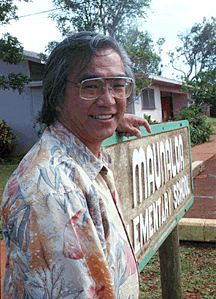"Hopefully, the program will get the students charged up and make them want to read," said Espaniola, president of the school Parent Teachers Staff Organization.
The rural school in a former pineapple plantation town is located near the end of the main highway in west Molokai.
Crime and rush-hour traffic are virtually nil. But isolation has its disadvantages.
The school is 17 miles from the nearest public library in Kaunakakai. It's also one of the schools in the state where students read poorly, Principal James Fuchigami said.

"It's just really a lack of exposure to literature and print," he said.
To solve the problem, the school is starting a reading program that was developed in New Zealand and has been successful at Lanai High & Elementary School.
"It's an excellent program," said Maui district superintendent Ralph Murakami.
A key to the program has been donations from corporate sponsors.
On Lanai, the Lanai Co. donated $100,000.
At Maunaloa, Molokai Ranch has contributed $24,000.
Fuchigami said the money is paying for books and the expenses of bringing a master teacher from New Zealand to instruct students and teachers.
The program will enable students to read a book a day, some about three pages long, and report on their progress.
A unique part of the program is the way it involves parents, who are asked to read to their children daily for five to 10 minutes.
Parents are also being asked to volunteer to read to students during class.
Fuchigami said he knows some parents may not be able to read to their children every day but the school wants them to know what it expects to nurture good reading skills.
Similarly, the school has set goals for reading excellence at each grade level.
Espaniola, 33, who graduated from the University of Hawaii-Hilo in 1990 with a business administration degree, said some children look at reading as a chore.
"I hope the program makes them read better and like reading," he said.